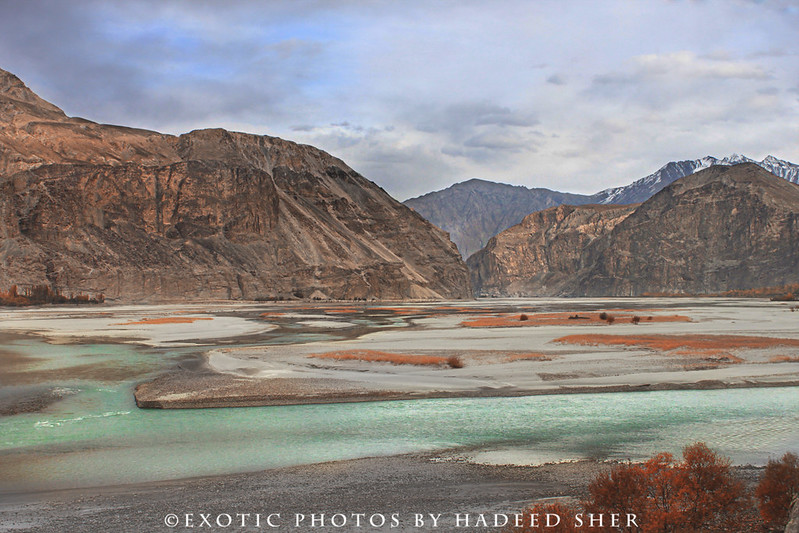
The following information about Shyok river is given by Raheel Adnan.
Historic touch - extracted from "Karakoram and Western Himalayas" - 1909 by Flippo de Flippi. The Italians travelled from Pinidi - Kohala - Jhelum Valley - Sri Nagar - Sonamarg - Dras - Olding - Gambat - Gol and onwards to Skardu. The team led by Duke of Abruzzi attempted K2. "About eight miles below Parkutta the Indus meets one of its greatest confluents, the river Shyok, which comes down from the Dapsang table-land, gathering in its course of nearly 400 miles the waters of the numberless glaciers which flow down the southern slopes of half the Karakoram. As at Dras, the meeting of the waters takes place at the bottom of a narrow gorge. Oestreich has identified at a height of from 700 to 1,000 feet above the present level, on the walls of both valleys, what he considers the remains of level terraces which marked the confluence of these two rivers at an earlier period. There are signs which indicate that the Shyok was at one time filled up by a glacier which projected into the Indus valley, where it formed a barrier some 1,000 feet in height, but did not, however, dam the course of the river. This phenomenon can be seen to-day in the upper Nubra valley, and we shall find a most clearly marked example in the case of the Biafo glacier. The whole of this region is still very little known, and the data we possess regarding its glacial history, as well as all other questions concerning the Indus basin, are so incomplete as to be hopelessly insufficient to support any general theory. As early as 1847 Thomson observed that the he of the loose rocks and detritus at the mouth of the gorges and lateral valleys suggested a glacial origin. Conway identified them more explicitly as loose boulders and moraine residuum. Oestreich believes that the Indus valley itself was never occupied by a glacier, but only the tributary valleys. In fact, geologists in general seem to hold that the Himalayan region has never been the scene of periods of " Inlandeis " (hke Greenland, Europe and North America), nor of large " pedemontane " glaciers (such as the Malaspina glacier in Alaska, and the former glaciers on the northern slopes of the Alps) ; but has merely witnessed periods of very considerable expansion of the glaciers in the mountains themselves, such as took place in the valley of the Po, where only the largest glaciers succeeded in emerging from the valleys as far as the edge of the plain. Godwin Austen is of this opinion, and cites indications of two distinct glacial periods, separated by an interval of milder chmate. Strachey and MedUcott hold similar views."
